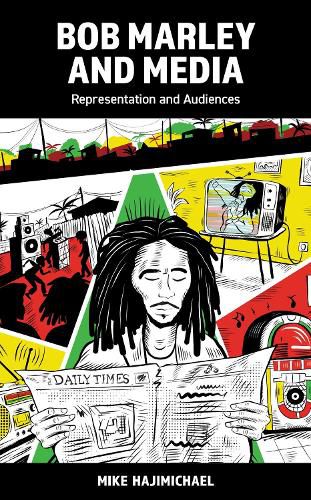Readings Newsletter
Become a Readings Member to make your shopping experience even easier.
Sign in or sign up for free!
You’re not far away from qualifying for FREE standard shipping within Australia
You’ve qualified for FREE standard shipping within Australia
The cart is loading…






Bob Marley and Media: Representation and Audiences presents an analysis of how media, radio, television and print represented Bob Marley, including his popularity after his death. Mike Hajimichael examines unexplored connections between Bob Marley and media representation and the specifics of audiences, including coverage in tabloids, music magazines, and fanzines, as well as radio and television interviews.
Hajimichael builds an extensive catalogue of Bob Marley's media engagements and connects Marley to media through forms of political discourse and ideologies relevant to social change in different contexts globally, such as civil rights, anti-racism, Rastafari, and liberation movements. Given that varieties of representation exist, the book unpacks these media discourses with regard to public perceptions and key themes articulated, including mainstream versus fan-based coverage, issues of Rastafari, Black Consciousness, economic crisis, legacies of colonialism, slavery, racism, links to other music idioms, concepts of identity, and Marley's personal relationships.
$9.00 standard shipping within Australia
FREE standard shipping within Australia for orders over $100.00
Express & International shipping calculated at checkout
Bob Marley and Media: Representation and Audiences presents an analysis of how media, radio, television and print represented Bob Marley, including his popularity after his death. Mike Hajimichael examines unexplored connections between Bob Marley and media representation and the specifics of audiences, including coverage in tabloids, music magazines, and fanzines, as well as radio and television interviews.
Hajimichael builds an extensive catalogue of Bob Marley's media engagements and connects Marley to media through forms of political discourse and ideologies relevant to social change in different contexts globally, such as civil rights, anti-racism, Rastafari, and liberation movements. Given that varieties of representation exist, the book unpacks these media discourses with regard to public perceptions and key themes articulated, including mainstream versus fan-based coverage, issues of Rastafari, Black Consciousness, economic crisis, legacies of colonialism, slavery, racism, links to other music idioms, concepts of identity, and Marley's personal relationships.